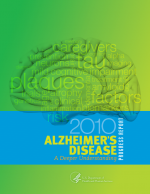Alzheimer’s Disease Progress Report: Intensifying the Research Effort is a new 3-hour online continuing education (CE/CEU) course that reviews basic mechanisms and risk factors of AD and details recent research findings.
 This course, from the National Institutes of Health (NIH), focuses on research findings reported and projects funded in 2011 and the first half of 2012. These highlights, prepared by NIH’s National Institute on Aging (NIA), the lead institute within NIH for Alzheimer’s research, covers work by an active scientific community. This work aims to elucidate the basic mechanisms and risk factors of Alzheimer’s disease, and then apply this knowledge to the development and testing of new interventions to treat or prevent Alzheimer’s disease. The efforts of researchers and clinicians—made possible by the many people who volunteer for clinical studies and trials—may one day lead to a future free of this devastating disorder. This course details some of the recent progress toward that goal. Topics include:
This course, from the National Institutes of Health (NIH), focuses on research findings reported and projects funded in 2011 and the first half of 2012. These highlights, prepared by NIH’s National Institute on Aging (NIA), the lead institute within NIH for Alzheimer’s research, covers work by an active scientific community. This work aims to elucidate the basic mechanisms and risk factors of Alzheimer’s disease, and then apply this knowledge to the development and testing of new interventions to treat or prevent Alzheimer’s disease. The efforts of researchers and clinicians—made possible by the many people who volunteer for clinical studies and trials—may one day lead to a future free of this devastating disorder. This course details some of the recent progress toward that goal. Topics include:
- A Primer on AD and the Brain
- Advancing the Future of Alzheimer’s Research
- Prevalence of AD
- Understanding the Biology of AD
- The Genetics of AD
- Assessing Risk Factors for Cognitive Decline and Dementia
- Developing New Treatments for AD
- Advances in Detecting AD
- Caring for People with AD
- Health Disparities and AD
Course #30-68 | 2012 | 39 pages | 21 posttest questions
Professional Development Resources is approved by the American Psychological Association (APA) to sponsor continuing education for psychologists; the National Board of Certified Counselors (NBCC ACEP #5590); the Association of Social Work Boards (ASWB Provider #1046, ACE Program); the American Occupational Therapy Association (AOTA Provider #3159); the Commission on Dietetic Registration (CDR Provider #PR001); the California Board of Behavioral Sciences (#PCE1625); the Florida Boards of Social Work, Mental Health Counseling and Marriage and Family Therapy (#BAP346), Psychology & School Psychology (#50-1635), Dietetics & Nutrition (#50-1635), and Occupational Therapy Practice (#34); the Illinois DPR for Social Work (#159-00531); the Ohio Counselor, Social Worker & MFT Board (#RCST100501); the South Carolina Board of Professional Counselors & MFTs (#193); and the Texas Board of Examiners of Marriage & Family Therapists (#114) and State Board of Social Worker Examiners (#5678).














